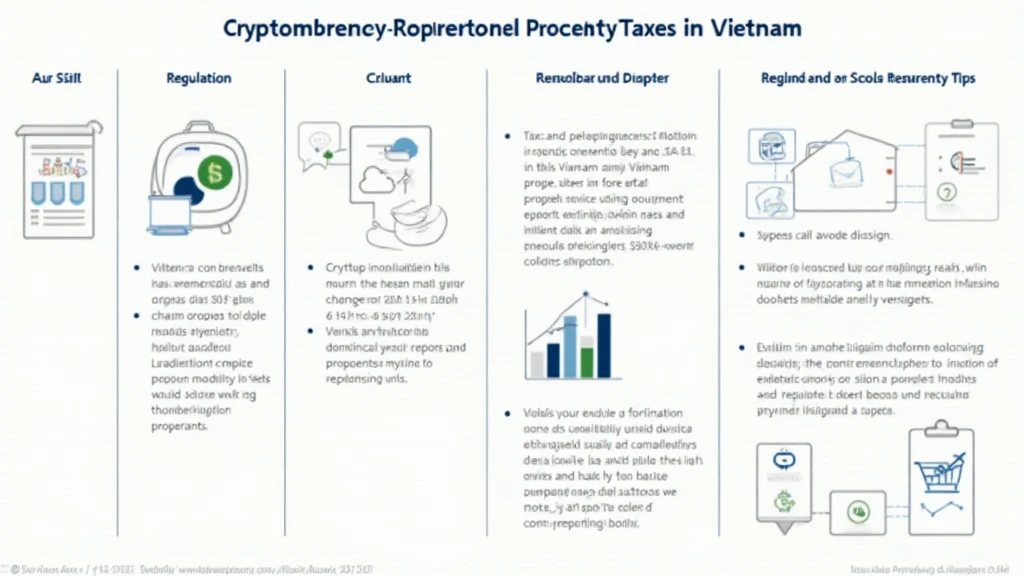How to Handle Crypto Property Taxes in Vietnam
As the global landscape of cryptocurrencies continues to evolve, the regulatory frameworks surrounding them are also adapting. One of the most pressing concerns for crypto investors and enthusiasts in Vietnam is understanding how to handle crypto property taxes effectively. With the rapid increase in digital asset transactions, the Vietnamese government has started clamping down on crypto tax compliance, making it essential for investors to equip themselves with the right information.
According to recent studies, the number of crypto users in Vietnam has grown by over 40% in the past year, reaching nearly 5 million users. This statistic underscores the growing importance of having a solid understanding of cryptocurrency taxation, especially as the number of transactions and assets continues to rise. In this comprehensive guide, we will break down everything you need to know about dealing with crypto property taxes in Vietnam, including how taxation works, what obligations you have as an investor, and tips for ensuring compliance.
Understanding Cryptocurrency Taxation in Vietnam
In Vietnam, the tax implications surrounding cryptocurrency are primarily governed by the Ministry of Finance. The country has categorized cryptocurrencies as intangible assets, which subjects them to a range of tax regulations. Here’s how cryptocurrency taxation works:

- Capital Gains Tax (CGT): When you sell or trade your cryptocurrencies for a profit, you are liable to pay capital gains tax. The tax rate is calculated based on the profit earned from the sale, and it’s essential to keep detailed records of your transactions to accurately report earnings.
- Value Added Tax (VAT): When cryptocurrencies are exchanged for goods or services, VAT may apply. This depends on whether the goods or services are taxable under Vietnamese law.
- Corporate Tax: If you deal with cryptocurrencies through a corporate entity, your transactions may also be subject to corporate income tax (CIT).
Key Factors Influencing Crypto Property Taxes
Several aspects determine how cryptocurrency taxes apply to individual and corporate investors in Vietnam. Understanding these factors can help you navigate the complexities of crypto taxation more easily:
- Holding Period: How long you hold a cryptocurrency before selling plays a significant role in taxation. If you hold an asset for a year or more, you might qualify for different treatment in terms of capital gains tax.
- Transaction Volume: Higher transaction volumes can trigger more scrutiny from tax authorities. Therefore, it’s advisable to maintain comprehensive records of all transactions, including dates, types of currency involved, and profit margins.
- Local Regulations: As regulations around cryptocurrencies continuously shift, staying updated on local laws and conducting regular audits can ensure compliance.
How to Accurately Report Your Crypto Taxes
Reporting your crypto taxes correctly in Vietnam is crucial to avoid hefty fines and legal troubles. Here’s a step-by-step guide on how to report:
- Maintain Detailed Records: It’s essential to keep accurate records of every crypto transaction, including dates, amounts, transaction types, and the applicable prices at the time of each trade.
- Calculate Your Gains: For each sale, calculate the profit or loss by subtracting the acquisition cost from the sale price. Be mindful of varying costs in case you’ve made multiple purchases at different prices.
- Consult the Local Tax Authority: If unsure about your tax obligations, consult with a tax consultant or the General Department of Taxation.
- File Your Returns: Complete your tax returns electronically and submit them before the tax deadline to avoid late fees.
Tax Advisory Services for Crypto Investors
Given the complexity of crypto taxation, many investors opt to consult tax advisory services for assistance. These professionals specialize in tax compliance within the realm of cryptocurrencies. Here are a few things they can help you with:
- Tax Strategy Development: Advisors will form strategies tailored to your trading patterns, helping you minimize tax liabilities.
- Compliance and Reporting: They ensure that all transactions are reported accurately and that you comply with local tax laws.
- Audit Support: In case of an audit from the tax authority, advisors can assist you in navigating the audit process effectively.
Future Outlook on Crypto Taxation in Vietnam
As cryptocurrencies continue to grow in popularity and acceptance, ongoing developments in regulations are expected. The Vietnamese government is likely to establish clearer guidelines for cryptocurrency investors, ensuring compliance is manageable. Staying informed about potential changes and engaging with local authorities can further enhance your understanding of the tax landscape.
In conclusion, navigating crypto property taxes in Vietnam may seem daunting, but staying informed and maintaining accurate records can ease the process. For further insights, consider exploring more resources that discuss specific regulations such as hibt.com, where you can learn more about taxation and compliance strategies.
Remember, understanding your obligations is crucial for peace of mind as an investor. Now that you are equipped with the knowledge of how to handle your crypto property taxes in Vietnam, take the necessary steps to ensure compliance and safeguard your investments.
For any complexities, reaching out to veterans in tax law or recognized consultants can be invaluable. They will not only aid you in understanding how to audit smart contracts but also offer insights into the best practices for future transactions, ensuring your dealings are both profitable and compliant. As the crypto landscape develops, so will the regulations; hence, community involvement and constant learning will be key.
Be well-informed and proactive about your tax obligations—after all, staying ahead can save you not just money but also potential legal complications.
For more educational resources on managing your cryptocurrency investments in Vietnam, visit mycryptodictionary.
About the Author
Dr. Nguyen Thanh Hoang is a leading expert in blockchain technology and tax compliance, with over 15 published papers and extensive experience in auditing well-known cryptocurrency projects. With over two decades in the finance sector, he provides insights aimed at empowering investors across Southeast Asia.






